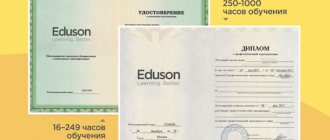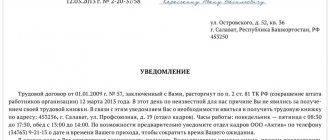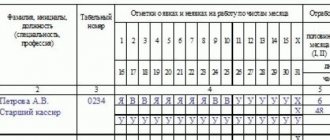Requirements for students
The course “Human Resource Management” is a distance learning course that you can take at our center if you have a higher, secondary specialized or primary vocational (vocational) education. This condition is mandatory. In this case, professional retraining of a personnel officer will take only a few weeks, after which you will be able to receive a diploma.
Professional retraining to become a HR specialist remotely will provide an opportunity, without interrupting your main activity, to receive a diploma of the established form and continue to engage in your activities. You can take HR courses online with us both on a desktop computer and on a smartphone or tablet.
Advantages of training HR specialists at VSTU
- HSTU courses comply with the Federal State Educational Standards, the requirements of the legislative framework and the standards of the organization of personnel services.
- Duration of training - from 2 weeks to 3 months, depending on the number of academic hours.
- It is possible to draw up an individual training plan, taking into account the intensity and available free time.
- Education documents (diplomas, certificates, certificates) comply with legal requirements and are issued on strict reporting forms with several degrees of protection.
- The agreement between GSTU and the listener governs the relationship between the parties and the prices in it cannot be changed after the conclusion of the agreement.
- The reputation of GSTU has been developed over the years in cooperation with federal corporations and large organizations, while tuition prices are competitively low.
- The distance learning format provides an opportunity to receive additional education from anywhere in the country - all you need is access to the Internet.
Training HR specialists at GSTU is an excellent chance to develop work activity, gain HR management skills and the opportunity to start your own business in the field of HR management.
Fully distance learning
We offer completely distance learning in the field of “HR Administration”: you will not be required to attend classes, come to us to enroll or pick up a diploma. You can sign up directly on the website and start the course within 5 minutes after payment. You can take training on a computer (at home or at work), laptop, smartphone or tablet. At the same time, you independently determine the course schedule - you can study on weekends and even at night. It is not necessary to have fast Internet - mobile Internet will be enough.
Professional retraining courses for personnel officers
The main goal of professional retraining is to master current theoretical knowledge, acquire new skills, and improve them for the efficient and effective performance of direct work responsibilities. Upon completion of the courses, students:
- Will know the legal and historical, economic, social and public foundations of personnel matters;
- They will be able to correctly draw up regulatory documentation and act in accordance with the current legislative framework governing labor relations and payroll;
- Master modern information technologies and personnel accounting hardware;
- They will learn to organize the hiring and dismissal of employees in accordance with the legislative provisions of the Russian Federation.
Personnel records management requires knowledge in the field of personnel selection and assessment of its value in the labor market. The professional activity of a specialist is regulated by the Labor Code of the Russian Federation and professional standards, which were approved by the Ministry of Labor of the Russian Federation on October 6, 2020. The duration of the courses is 250 hours or more (depending on the target audience and the chosen direction).
How are seminars and courses on document management useful for specialists?
Training courses and seminars on personnel records management will help the HR officer to correctly organize personnel work within the company, taking into account current regulations. Properly organized document flow within an organization is the key to coordinated and efficient work of the entire team. In courses on personnel and office management, the student will be able to learn how to correctly draw up various types of documents and keep records of them. Training is conducted in the following forms:
- individual programs: the student studies the material largely independently, mainly remotely;
- group classes: students study with a teacher in classrooms during the day or during the day;
- corporate courses: training for employees of a specific company with on-site trainers from the training center, that is, without taking the staff away from the workplace.
What are the best HR courses to take?
03/11/2008 15:38 | LinkMilusya
I don't agree. I studied there last year. I posted a review on their website, but it was obviously removed from there))
Having achieved certain successes in professional development and climbed the career ladder to a higher level, I thought about the need to gain additional knowledge in my chosen profession. I decided to get them at the School of Politics and Business. I made an appointment, arrived, got acquainted with the curriculum, looked at the licenses, samples of issued documents on professional retraining, filled out the application form, paid for the training. On the appointed day I started classes. I would like to dwell in more detail on some administrative aspects and the effectiveness of each subject. On the first day of classes, we were given a schedule and manuals for the beginning subjects. I note that the schedule was only for the first month of classes (subsequently, that’s what they gave us - for a month and a half). So, the first subject was “Legislative Framework”. A few minutes after the lecture started, I was shocked. It felt like I was in a fairy tale, or rather, in a theater of the absurd. Rev. talked a lot, but about nothing. Attempts to bring him back into line with the course's theme were unsuccessful. After the third lesson, there was a desire to contact the administration in order to replace the teacher. But they didn’t dare. We listened to the nonsense to the end. The result is that I feel sorry for the time spent. Usefulness - zero. Next on the schedule is “Personnel Psychology.” We were given technologies to work according to S. V. Ivanova’s method. But we lost a lot of time on testing, which is absolutely useless and inapplicable if there is no higher psychological education. Some tests were certainly interesting, but only from the point of view of general development. In the professional activity of a personnel and personnel manager, they are not necessary. At the end of the course there were three practical exercises. Thanks for them! We also taught courses “Recruitment Technology”, “Personnel Management Technology” and “HR Management”. The structure of all lectures was built according to the Soviet principle - we were READ lectures. We took notes. As for the subject “Personnel records management”, this style is quite justified. We received knowledge on the subject, answers to questions of interest, our attention was drawn to the key points in the preparation of some important personnel documents, we examined the nuances that are difficult to find out on our own. This item can be considered a success. The only drawback is that we did not have time to complete the program. Did not have enough time. As for the other two subjects, we received summary material that can be read in any textbook on personnel management. And we have no idea about the practical side of the issue. As a result, we did not receive any “working” technologies or skills to use them in real conditions that would allow us to effectively manage personnel in practice. So, it turns out that we are also in trouble with the “managerial block”. The penultimate subject was “Negotiation Technologies”. From me personally, thank you very much. From this subject I received real-life technologies based on logic, which have already helped me in my work. All our classes were practical, held in the form of business games, in which every (!) student participated. It is also impossible not to note a very well-written manual, the materials of which will be useful in your work. I find this item very effective. But not all listeners of our group share my opinion. Not everyone understood this subject and its presentation. In my opinion, this is due to the limited time allocated for it (only 4 classes, one of which is a test). But if the student is “friendly with logic”, the training was preceded by work experience or training, then you can get a huge return from this subject. And finally, at the end of the course, three weekends devoted to 1C classes (two classes on 1C 7.7. “Salaries and Personnel” and one on 1C 8.0 “Salaries and Personnel Management”).
Summarizing what has been said, I will draw some conclusions: 1. Ideal for those who need a diploma of professional retraining - it is quite suitable. However, in this case, it is more advisable to receive education in absentia. 2. Not enough practical training. 3. If the course structure had been structured differently, the impact from the classes would have been much greater. The 1C 8.0 program “Salary and Personnel Management” (for which only 1 lesson was allocated) allows you to combine the work of the entire personnel department. From strategic goals to personnel work. If we had spent more time studying the program at the first stage of training, combining it with classes in HR and Personnel Management, we would have received a synthesis of knowledge and program capabilities that would allow this knowledge to work. 4. As a consequence of the ill-conceived structure of the course, the fragmentation of the knowledge gained, the ineffectiveness of some subjects. 5. Taking an active life position, I still got the most from these courses, but I would like the efficiency to be higher))
Additional information on the topic HR records management (6)
- Seminar, Online broadcast Current changes in Labor legislation 2020: foreigners. Occupational Safety and Health. New developments in labor law Moscow June 16, 2020 October 13, 2020 Current changes in Labor legislation and Trends 2020 is a seminar that reveals to students all the current changes in labor legislation, will help you see the pros or possible disadvantages of innovations for the company in order to gain advantages in personnel management or avoid mistakes and fines. 13,400 rub. 10 800online add to favorites sign up
- Seminar, Online broadcast Complex issues of working time accounting: flexible hours, shift work, cumulative accounting, long working hours, hazardous working conditions. Time relax. Legal aspects, implementation and proper execution Moscow June 29-30, 2020 October 12-13, 2020 During the seminar, students will learn the latest changes in labor legislation: Federal Law of July 18, 2017 No. 125-FZ, changes to Articles 93, 101, 108, 152, 153 Labor Code of the Russian Federation, will receive a detailed understanding of working hours that differ from normal ones, will learn how to draw up various types of schedules, will learn about legal restrictions and typical mistakes when managing working time. 25,800 rub. 20 700online add to favorites sign up
- Seminar, Online broadcast Foreign workers in 2020: personnel, legal and tax aspects Moscow July 20-21, 2020 December 7-8, 2020 During the seminar, participants will receive a detailed overview of the current legislation with the latest and most current changes in 2020 regarding the attraction of foreign labor , quota procedures, features of the patent system and employer liability for violations. In addition to studying legislative norms, the seminar will consider examples from judicial practice and law enforcement practice of government agencies in Russia. 25,800 rub. 20 700online add to favorites sign up
- Seminar, Online broadcast Features of regulation and registration of labor relations with drivers of motor vehicles Moscow September 7-8, 2020 December 14-15, 2020 Seminar participants will learn about the features of labor regulation of motor transport drivers, learn about the restrictions and responsibility of the employer for non-compliance with regulatory documents (from the requirements of the Labor Code of the Russian Federation before the resolutions of the Ministry of Transport) regarding the work and rest regime of drivers. 25,800 rub. 20 700online add to favorites sign up
- Seminar, Online broadcast Confidential information and confidential paperwork Moscow September 10-11, 2020 At the seminar, students will learn about the principles of constructing confidential proceedings. Get acquainted with the procedure for interaction between open and confidential proceedings. They will consider the stages of creating confidential records management and practical recommendations on the procedure for creating it. Learn about ways and means of protecting confidential records. They will learn to use cryptographic information security tools as the most effective way to protect an electronic document. 25,800 rub. 20 700online add to favorites sign up
- Seminar, Online broadcast Foreign workers: current changes in 2020 Migration registration, registration of permits, business trips. Typical mistakes St. Petersburg September 28-29, 2020 2019 was marked by the introduction of a number of significant legal changes regarding the stay of foreign citizens in the Russian Federation. First of all, changes to the Federal Law “On Migration Registration” concerning the place of stay (registration) of foreigners, the concept of the receiving party, and the removal of foreigners from migration registration. New grounds for administrative and criminal liability for migration violations have also emerged. The number of responsibilities of persons inviting “visa” foreigners has increased significantly. The seminar will help representatives of employers hiring foreign citizens understand the intricacies of the new laws, avoid mistakes and penalties. 25,800 rub. 20 700online add to favorites sign up
License for educational activities No. 038379
Training course program “HUMAN RESOURCES”
1. Fundamentals of human resource management
1.1 Principles, methodological foundations and models of personnel management 1.2 Work ethics in the personnel management system
2. Essence, purpose and main goals of the personnel management strategy
2.1 Development of personnel management and human resource management strategy 2.2 Essence, structure, assessment of intellectual and human capital
3. Organizational context of HR management
3.1 Determination of an individual system of motives and factors that determine human behavior at work 3.2 Introduction to the theory of goals, methods of influencing employee motivation and forms of material incentives
4. Employees' commitment to their organization
4.1 The role of commitment in HRM theory and the strategy of mutual commitment 4.2 Strategy development: goals, plans, resources
5. Various functions of organizations
5.1 Organization theory as part of management science 5.2 Organizational process 5.3 Basis of group behavior, teamwork, leadership and types of power
6. Corporate ethics of the organization
6.1 Role, structure, classification and assessment of corporate culture 6.2 Consideration of work to consolidate culture
7. Human resource management process
7.1 Introduction to HR policy theory 7.2 Relations and equality policy 7.3 Concept, essence and factors determining competence and competency 7.4 Analysis of jobs, roles and competencies 7.5 Intellectual resource management, social capital and organizational culture 7.6 Models of core competencies, repertory grid techniques and types of surveys
8. Enterprise labor resources
8.1 Theoretical foundations and tasks of human resource planning 8.2 Management of personnel turnover, provision, attraction and retention of personnel 8.3 Recruitment rules and methods of attracting candidates 8.4 Recruitment of candidates on websites, application selection process 8.5 Types of job interviews
9. Employment and dismissal: documents, rights and obligations
9.1 Selection interview and approaches to conducting an assessment interview 9.2 Methods of conducting interviews when applying for a job 9.3 Professional selection, psychological tests and analysis of test results 9.4 Introduction to the organization 9.5 Legal norms of reduction in the enterprise and dismissal
10. Performance management
10.1 Labor efficiency indicators 10.2 Introduction of labor performance management 10.3 Purpose and principles of labor performance management
11. Performance management processes
11.1 Main activities and structure of performance agreements 11.2 Criteria for assessing work performance and management of continuous training 11.3 Conducting performance reviews, pros and cons of assessing performance 11.4 Achieving consistency in the work of all management levels and factors for introducing performance management 11.5 Documentation rules
12. Method of current personnel assessment
12.1 Definition and methodology for conducting 360-degree feedback 12.2 Pros and cons of feedback 12.3 Human resource development system and personnel training 12.4 Definition, characteristics and organizational behavior in learning organizations 12.5 Organization of the staff training process 12.6 Methodology, methods and options for learning styles 12.7 Autonomous training
13. Vocational training system
13.1 Features of the process and identification of needs for vocational training within the organization 13.2 Strategic management in vocational training 13.3 Methodology for drawing up plans and organizing training programs 13.4 Classification of teaching methods. Features of sales training. Technical and Vocational Training 13.5 Vocational Training System: Responsibility for Training and Assessment of Vocational Training 13.6 Training of Office Workers and Meeting the Training Needs of Special Groups
14. Personal development planning
14.1 Setting goals in planning and the need for personnel development
15. Qualifications of the organization’s management personnel
15.1 The role and basis of leadership development 15.2 Activities and approaches to leadership development 15.3 Emotional intelligence and leadership skills 15.4 Responsibility for leadership development and the role of the human resource development specialist
16. Career management of the organization's personnel
16.1 General goals and process of career management 16.2 Basics of career management policy. Assessment of labor indicators and potential 16.3 Planning of supply and demand. Career planning methodology
17. Evaluation of the performance of company personnel
17.1 Definition and main features of assessment of various types of work activity 17.2 Classification of work activity of enterprise employees 17.3 Point-factor schemes and other methods of assessment of work 17.4 Introduction of work assessment and formal assessment of work 17.5 System of measures for assessment of types of work
18. Building relationships with employees
18.1 Formation of the structure of relations with employees. Relations with employees from the point of view of HRM theory 18.2 Features of collective bargaining and contracting. Unitary and pluralistic perspectives 18.3 Relations between organizations and trade unions and non-recognition of trade unions by employers 18.4 The concept and structure of industrial relations and the creation of a climate of trust 18.5 Processes and rules of construction in the field of employee relations 18.6 Brief overview of levels of negotiation: preparing for negotiations and reaching agreements 18.7 Processes in the field of industrial relations. Involvement and participation of workers in the management of the organization 18.8 Management with and without trade unions 18.9 Negotiation skills and the ability to reach agreement 18.10 Plant reviews, proposal systems and works councils 18.11 Communication systems
19. Basics of labor protection in an enterprise
19.1 Occupational health and safety, conducting audits 19.2 Hazard identification and risk assessment 19.3 Right to social security and comprehensive health programs 19.4 Implementation of employee welfare programs and types
20. Recruitment and human resource management
20.1 Concluding employment contracts and monitoring attendance 20.2 Equality of opportunity and combating discrimination in the organization’s personnel policy 20.3 Procedures in the human resource management system 20.4 Automated information systems for human resource management 20.5 The process of assessing the parameters of the HRM system and the use of application programs
The distance course “HR Management” of the International Academy of Business will tell you about the features of building relationships with employees, teach you to understand the processes of managing performance indicators and introduce you to the policy of managing personnel careers. You will learn all the intricacies of human resource management. Apply now for the HR course and in just a few weeks of training you will have everything you need to know to succeed in HR!
Apply for training and get access to a demo lesson!









